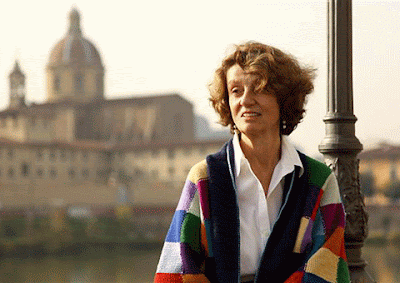Camilla Trinchieri
Camilla Trinchieri worked for many years dubbing films in Rome with directors including Federico Fellini, Pietro Germi, Franco Rossi, Lina Wertmüller and Luchino Visconti. She immigrated to the US in 1980 and received her MFA in Creative Writing from Columbia University. Under the pseudonym Camilla Crespi, she has published eight mysteries. As Camilla 
My Q&A with the author:
How much work does your title do to take readers into the story?Visit Camilla Trinchieri's website.
I don’t know how much of the story a reader will glean from my title. The word ‘taste’ is apt because my characters do a lot of eating in the series. In this story the taste is bitter because the victim is poisoned. I also wanted to underline how the victim’s family and friends might feel. Even the investigators. I also wonder what taste is left in your mouth when you discover someone you loved is the killer. It can’t be sweet.
What's in a name?
A name gives information. My main character’s name popped in my head—Nico (Domenico) Doyle. It told me he was the son of parents who came from different backgrounds, Italian and Irish, differences that can lead to difficulties. The mixed name seemed apt for a retired New York homicide detective now living in a small Tuscan town where his Italian wife is buried. Trying to make a new home for himself, Nico helps out at his wife’s family restaurant, adopts a mutt named OneWag (too proud to wag more than once) and gets involved in a new murder thanks to his friendship with Maresciallo dei Carabinieri, Salvatore Perillo. The maresciallo’s name reveals that he is from the south of Italy. Naples, in his case. His right-hand man, young, blushing Daniele Donato, has a name that comes from the north of Italy—Venice. The origin of these names might be lost on an American audience. They are important to me because I am Italian. The name has to fit.
Bitter Taste is filled with names, some belonging only to walk ons. Why give them a name if they are not vital to this mystery? Because I am trying to depict a village, its surroundings, its people ,.. people have names.
How surprised would your teenage reader self be by your novel?
Writing murder stories would have seemed perfectly natural to me. I emigrated from Italy to New Orleans. barely a teenager. I had gone to an American school in Rome, and I knew English. In my new school I started writing depressing short stories. I think I wrote to ground me. My teacher kept asking me to write what I knew. I wasn’t in the least bit interested in what I knew. It’s entering an unknown world, trying to understand people that interests me. That’s why I write murder mysteries.
Do you find it harder to write beginnings or endings? Which do you change more?
Beginnings take forever. I mull them over in my head for weeks sometimes. Place always comes first for me. It’s what got me started on the Tuscan series. On a trip from Sienna to Florence, I was intrigued by the small villages I drove through. Having lived only in big cities, I wondered what it would be like to live in a village and get to know the people. A place and a question gave me the beginning. The first book, Murder in Chianti, starts out with Nico roasting tomatoes in his new home when a gunshot goes off followed by a dog yelping. Nico runs out thinking the dog is hurt. To start the story for The Bitter Taste of Murder, Nico parks his car in the town piazza to meet his Dante-quoting friend for their usual breakfast at Bar All’Angolo. I wanted to show that Nico has planted roots in Gravigna. Maresciallo Perillo interrupts the peaceful morning by walking in to complain about his encounter with a very unpleasant wine critic. Murder isn’t very far behind.
As to endings, I find that the stories conclude naturally. All that needed to be said has been said. After murder, I try to end joyfully with a celebration filled with good food and wine.
Do you see much of yourself in your characters? Do they have any connection to your personality, or are they a world apart?
I love to cook and there is a lot of food in the series. Nico volunteers at the restaurant run by his wife’s cousin, Tilde, who is an excellent cook. Nico starts to come up with recipes to offer Tilde. Most of mycharacters are Italian as I am. They are familiar to me. I feel at home with them. I’m not sure if any of them connect to my personality. I don’t plan them. They come to me, just a spark at first, then as they speak, I discover who they are. I learned early on not to force them to do what I think is right. They’ll tell me what’s right.
What non-literary inspirations have influenced your writing?
My having to live in many different places has been an incredible inspiration. My father was a diplomat and we moved every four or so years to different countries. That is why place is so important to me. You come to a new city, knowing no one. You have to assess where you are, who the people around you are. I gave Nico that job.
Movies have been a very strong influence. I was in the dubbing business in Rome. For eight hours a day, sometimes twelve, I watched actors on the screen speaking lines, revealing their emotions. I think that’s the reason dialogue comes easily to me. I wanted to be an actress and now that’s what I do when writing. I try to become the character, thinking and doing what he/she dictates.
--Marshal Zeringue
